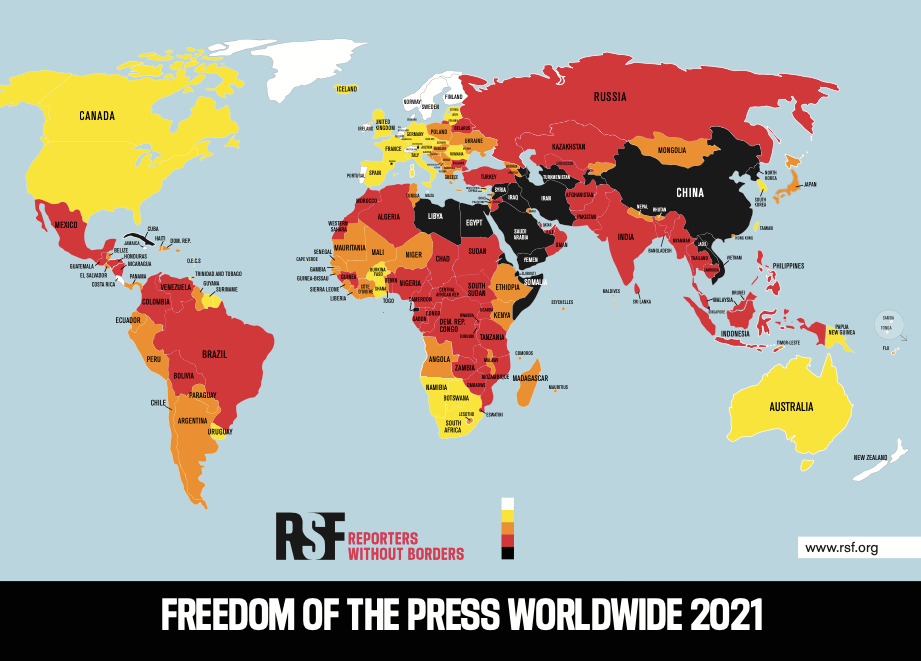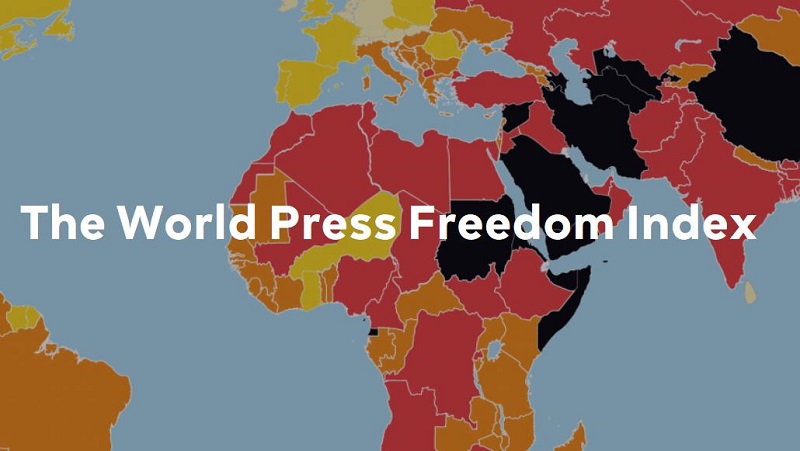Malta has retained its lowest recorded position in the 2021 Reporters Without Borders (RSF) World Press Freedom Index.
According to the international report published on Tuesday, Malta’s Press Freedom is still categorised as “problematic”, sitting just beneath Hong Kong and above El Salvador.
Since the Labour Party came into power in 2013, Malta’s press freedom ranking plummeted a staggering total of 36 places, from number 45 in 2013 to number 77 in 2019, and losing a further 4 places in 2020 placing the country at 81.
The country’s ranking dropped sharply following the assassination of journalist Daphne Caruana Galizia in October 2017 and continued to slide amid delays in the murder investigation and the government’s reluctance to establish a public inquiry into whether the State could have prevented the journalist’s death.
The issues that contributed to this year’s ranking include Prime Minister Robert Abela’s attempt to shut down the public inquiry before it fulfilled its obligations, the use of defamation lawsuits that continue to target journalists, and a media climate that remains deeply divided because of political party media ownership that stifles public debate and has created an environment where propaganda dominates the news.
Within the EU 27 countries, Malta sits in penultimate place, just above Hungary.
This year’s report notes how the COVID-19 pandemic has been used as a pretext to block journalists’ access to information, sources, and reporting in the field, with data showing that journalists are finding it increasingly hard to investigate and report on sensitive stories, especially in Asia, the Middle East and Europe.
RSF’s regional analysis describes how although Europe continues to be the most favourable continent for press freedom, violence against journalists has increased, and only some of its countries – including the three at the top of the Index, Norway (1st), Finland (2nd) and Sweden (3rd) – can claim to have adequately defended and supported press freedom and a robust media environment.
Several European countries have tried to limit the impact of information on sensitive subjects such as the pandemic and migration. In Serbia (93rd), for example, journalist Ana Lalić was arrested at her home late at night after covering a hospital’s battle with COVID-19, while in Greece (70th), authorities arrested journalists, often using excessive force to prevent contact with migrants.
Journalists covering demonstrations were attacked by supporters of far-right and conspiracy-theory groups during protests against coronavirus restrictions, especially in Germany (13th) and Italy (41st) and police violence against journalists also occured in Poland and Bulgaria.
Another cause for concern in Europe is the lack of justice for crimes against journalists and how the reluctance or inability of States to protect threatened journalists can have a chilling effect. The report notes delays and obstruction of justice in Malta, as well as other countries where impunity has made journalists more vulnerable.
These countries include Slovakia (35th), where the trial of those accused of murdering the investigative reporter Ján Kuciak resulted in the acquittal of the businessman accused of commissioning his murder, as well as Serbia, which saw the convictions of four people accused of murdering Serbian newspaper publisher Slavko Ćuruvija in 1999 overturned by a Belgrade appeal court in 2020 and requiring a retrial 21 years later.

The European country that saw some of the worst press freedom devolvement in 2020 is Hungary (92nd). Since March of 2020, Hungary enacted emergency legislation in order to block access to information that included the criminalisation of “fake news” about the coronavirus. When around 30 media outlets requested the information blockade be lifted, the Hungarian government refused. It also went on to target foreign media and even stripped the broadcast frequency of a radio station on an administrative pretext.
Beyond Europe, the country that registered the biggest drop was Malaysia, which fell 18 places to 119th, where problems include an “anti-fake news” decree, allowing the government to impose restrictions. Other notable drops in press freedom rankings were in the East African country of Comoros that slid 9 places to 84th and El Salvador that lost 8 places and is now 82nd.
This year, only 12 countries (7%) of the 180 surveyed offer a favourable environment for journalism and ever since RSF’s global press freedom indicator was created in 2013, there has been a 12% decrease in media freedom worldwide.














